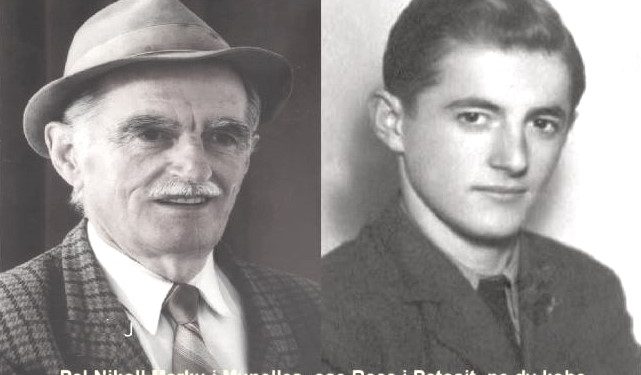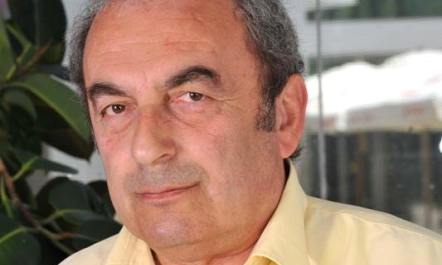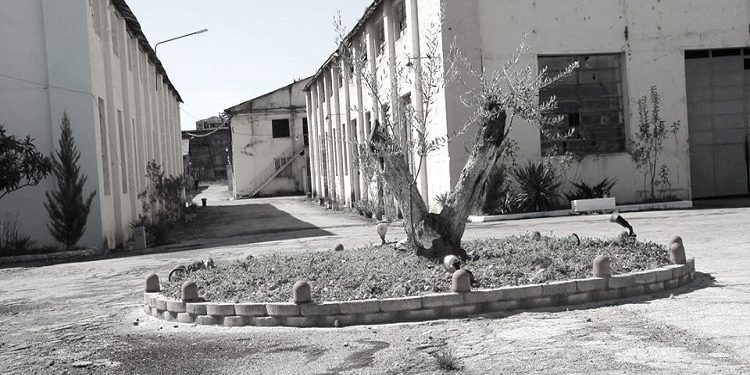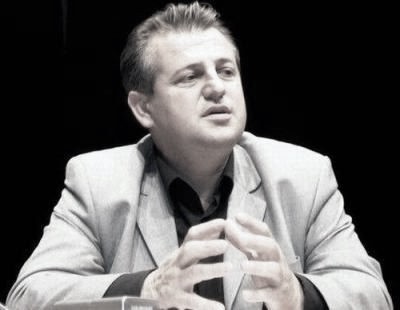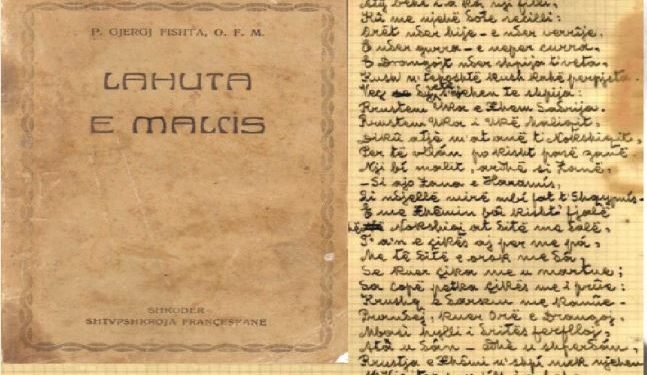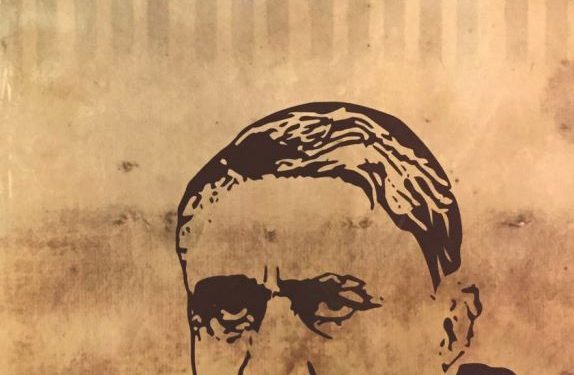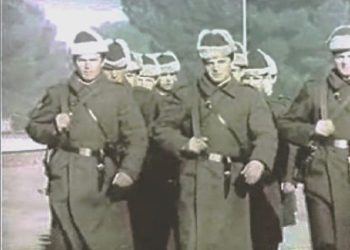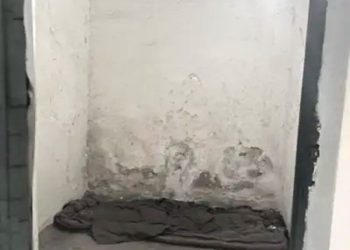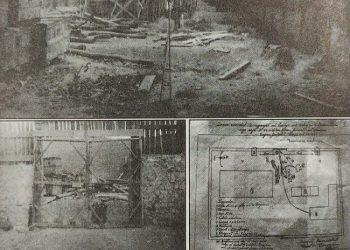From Ndue Dedaj
– How was persecuted by the communist regime, the mirditor Pal Nikoll Marku, a graduate of the Military Aviation academy in Belgrade, the erudite who knew by heart Fishta’s ‘Lahuta e Malcis’…?!-
Memorie.al / Some time ago, in Patos, at a lunch with friends, two honorable gentlemen, the literature professor of the city’s high school, Toli Shabani and the well-known local photographer, Kozma Çuko, began to tell us with great emotion, stories from the life of an unusual, erudite man, with a name not often heard, Pal Nikoll Marku. And we singled out one, which is related to the Fishtian masterpiece, “The Lute of the Highlands”, considering the two friends of Patosa as co-authors of this writing. Together with the Mirditor researcher Mark Mesuli, the author of the monograph dedicated to this elite gentleman, where we relied on the biographical data of the unfortunate protagonist of this story, separated from life two years ago. If “Baca Pal” were alive, this end of April, he would surely come back to his hometown, Mirdita, to announce the 100th anniversary of the “Government of Kimza”, under the mountain of Munella, as one of his “hawks” as he had already baptized himself.
But let’s come to his very special story with “Lahuta” of Fishta.
Story with dissidence, of the captain of the Albanian Aviation
…If that man, at that moment, had been able to, he would have followed the habit of the old monks, to copy by hand the book, which he would no longer have. The legendary book, which could no longer be hidden from him. The work that he was forbidden to keep, not only in the library, but also hidden in the houses and “beams” of the house. He calculated the time, and it was completely insufficient, for him to sit at the table and copy the “Lute” by hand, from the first verse to the last! It was not possible. But how would it be done then? Photocopy it? This was even more impossible.
There was a photocopier, only in the district Party Committee and only for the “Top Secret” materials, which came out with the signature of the first secretary, for the first of the country, in the Central Committee. But this was like a widow at the prison gate. To go to the headquarters of the Party and say: “Please, photocopy this poor book for me, ‘Lahuta e Malësi’ by Gjergj Fishta, because I have to eradicate it from the face of the earth, that is, destroy it, because word of mouth, word has come to me, that from today to tomorrow, I will be arrested for agitation and propaganda”!…And this is not at all a story of dissidence, which in our time circulates without any conscience killing by many, but a real event, which belongs to the year 1975, one of the peaks of the class war.
When “Lahuta” was an enemy of the Party!
So it was the middle of the 70s, in the city of oil workers in Patos. Pal Nikoll Marku, was finally a founder in the mechanical plant. Indeed, this had not been his trade, but that was how the jobs had come to him, down and down. This is exactly where his incident with ‘Lahuta’ begins, a story on its own. A novel like “Shakaja” by Milan Kundera. An Albanian saga under the dictatorship…!
It seems that in the factory, word had started to circulate about his possible arrest, so one day Pal was pulled aside by a young foundry worker, who worriedly said to him: “Dad, take care!… You told me how do you have the lute”? Baca had listened to the intelligent young man, who wanted to become an actor, but who had a mistake in his biography and was not eligible to study. They called him Kiço Londo…! (Years later, he would become a well-known director of the National Theater and its director). So things were bad.
Pali was accused, that when he was the director of the Technical-Scientific Library of Nafta (the only one of its kind in Albania), he had kept banned, “yellow” books, removed from circulation. Stamped books. Revisionist books! He had been the founder of that library, which was intended to feed the many specialists in the entire oil-bearing region of the country with professional literature. At the time when he was its director, there were constant letters to remove from circulation the books of the authors, who were attacked ideologically and politically, but without being told what to do with them, the library employees…!
And Baca had compiled a letter, which he had sent to the Party Committee, asking the superior party body, how to act concretely, since those books were in the inventory, but he had not received an answer…! But after the attack of the “saboteur” group in Nafta, General Director Lipe Nashi, and others, an accusation was also sought for Palin and the pretext was found, precisely in those banned books.
It was known that the investigators, after his arrest, would come to the house and search, they would find the “Highland Lute” and there was no need for another charge. And where were there more “monstrous” books at that time than the works of Fishta, whose grave was destroyed? How many people were condemned, precisely for this cursed book?! Keeping the “Lahuta” hidden at home was like keeping a gang of saboteurs, since the 50s. But this did not scare the “candidate”, for agitation and propaganda.
When that actor candidate told him that they could arrest him, so he should hide it or burn “Lahuta” as soon as possible, this one with an Olympic calmness, replied: “Yes, my noble friend, but I need three months to eliminate it “!
“How, three months, Baca? What are you saying? Not even three minutes…! And how did I have time to burn a book”?! “Yes, Mor, yes… you are fine and I thank you with all my heart, for caring so much… but that’s the way it is”!
Kiço Londo did not understand Paul, even though they knew each other’s secret language so well. “Why did he need three months, when he could burn him on the spot”?! For the first time, his scholarly friend seemed somewhat mysterious to him. However, he was convinced that he would find a solution, so that “Lahuta” would not be found as evidence. And luckily, after the handcuffs were ready, the copy of his letter, which was to be the rescue, was found under the glass of the new director of the library’s desk…!
Later, in an interview, Londo would say that; the acquaintance with Paul had been decisive in his all-round formation and that he considered Baca as a very knowledgeable, kind, humane man, who was hit by the communist system, but if the world survives and succeeds. The director remembered that he was treated by him, just like his two sons, Gjergji and Sokoli, maybe even more pampered than them…!
The man who fell together with the socialist camp!
A year waiting for the answer to the letter addressed to Enver Hoxha, ’75 was not his first fall…! It happened 15 years ago, in the sixties. He had been a career soldier, of a special specialty, a man of the sky, more than of the earth, since the flights of fighter planes could not be made without his permission. He would say whether or not the weather was good for flying planes, so he was appointed to serve as an officer at airports and aerodromes…!
But with the collapse of the social camp, former students educated in the former republics of the Socialist Camp also fall one by one. Thus, in 1961, Paul was suddenly expelled from the Party and released from the army, being accused of “cooperation with the enemies of the people”?! But without ever saying, with whom! The debate in his air regiment started about the famous meeting of 81 communist parties in Moscow.
After that, he is found driving a pen of oxen plowing the land, in his hometown, Kalivare. His native village had been heard quite a bit in history and he felt good about it, but he never thought that he would be “stuck” there, as a prodigal son of the revolution. After being expelled from the Party, he felt bad! He writes a long letter to Enver Hoxha, with an idealistic language, from the refined Albanian, who loves his country, and while waiting for the answer to that letter, he remains “on the run” for a whole year, under the shadow of Munella. He hoped that the clouds above his head would disappear and he would not go with a “stain” to his family, his wife Violeta, mother Prena, whom he treated with divine care, but the answer never came, from the country’s biggest.
Paul was there, as if waiting for Beckett’s Godot, but it is known that Godot does not come and the erudite man, possessor of several foreign languages, was trying the communist absurdity on his back, leaving him simply to push the plow. It was an unparalleled disappointment. How was it possible that he, one of the missionaries of the new era, was thrown away like that, by the army, the party, the Synoptics…! Another was the slogans of the Party for “people’s democracy” and another was the harsh Albanian political reality, pregnant with so much class war.
Throughout his life, he was accompanied by many authentic instruments of his native land, the northern regions, among them “Lahuta…” of Fishta, which he inherited from his father, so he was unable to separate from her. Paul stayed for three months, memorizing the “Lute of Malcì…! He, those three months, that he had “asked” Kiço Londo, had learned “Malcì’s Lute” by heart. The moment he had heard the announcement that the famous book had to disappear, he had calculated in his mind how much time he needed to memorize it.
16,000 verses would be written in his head! This was a record. Maybe Fishta himself did not know everything by heart, his “Homeric” epic. Even if learning the “Lahuta” by heart was a fashion of the people of the time, not only the northern ones. It is known that many southerners knew the “Lahuta” by heart, such as the well-known folklorist Fatos Mero Rrapaj, and others.
After three months, after he had “hidden” it in his head, finally the master decided to burn “Lahuta”. He had put it in the hearth and set it on fire, but the book was not only burning slowly, but it was releasing a suffocating smell that was almost taking his breath away. Soon the wind and smoke came out of the small room of the apartment, in the corridor of the building and in its door, the neighbors were given. They were also out of breath, what was happening?! What was Paul burning…?! It wasn’t magic, of course (though magic would be shadowed in such a case), but the book was old, and the heavy smell it gave off came from the chemical content of the substance the publication was made of.
… (There were quite a few others who knew many songs of “Lahuta” by heart. But they didn’t make a sound. They rarely fired, they “deconspired”…! It was 1984, when we, some teachers of language and literature, were tasked to collect rare words, during the summer holidays, on behalf of the Institute of Linguistics and Literature. When we were talking about the old “things”, in Kalor (Hungary), on the lawn in front of the village shop, a man called me the bassist, from village B., about 50 years old, started to recite the song by “Oso Kukë”… I told him under his breath that he had read “Lahuta” by Gjergj Fishta, but immediately Marku, (that’s his name) stepped. , how much from me, how much from the seller who was a communist, how much from two or three other people, who had gathered there by chance, to “supply” me with rare words.
“No, he returned to me, I said the song of Oso Kuka, which I read in the Folklore text of the 11th grade”! “But the song has only 15 verses, and you told us three times as many”?! – I didn’t give up, always in good faith of the seller of Kashnjetas, with a whole party in his pocket, who, besides being my lover, was a noble man. In order not to prolong it, I approached Mark’s ear and told him that I did not “use” the high school, which I had completed for Literature…! When he turns to me again: “You there, you only learned three lines, that Fishta is a reactionary”!
“Yes, – I told him, – but there is school and above school”, without being pushed any further, I told him that for two years, I had in my hands “Lute of Malësë” and “Anzat e Parnas”, given by my ungj (then an official of the state prosecutor’s office), but “Lahuta” was wrapped in the cover of a Russian novel, with the title “White Bread”…)
A monograph, for a unique character!
The dedicated researcher Mark Mesuli, a graduate in languages and literature, found a symbolic title for his interesting monograph, “Munella’s Falcon”, a book that would be a tribute to any library, for what it brings from the unwritten memory of the past half century. , including a bunch of selected photos. Before that, he had served as the mayor of the municipality of Gjegjan, and when he had “tracked” Paul, he had taken the long way to meet him in Patos and, to “return” to his hometown, through the invitation that Baca Pal, help to make the emblem of the municipality, any announcement, etc.
When he asked him to write a book about him, he did a lot to silence Paul, who was not prevented from speaking by anything else, except by his brilliant modesty. However, with difficulty, a monograph was being written about a man, full of dissidents, except that he did not consider himself as such and did not want himself to be published, while dozens of biographical booklets were flourishing, for a bunch of mediocre employees who did not had something to say, with their lives.
Pali was born on April 28, 1926, in Kalivare. After the first lessons in the dormitory “Mirdita” in Oroshi, he completed the “Normal” in Elbasan, in the years 1938-1944. Involved in National Liberation Anti-Fascist youth forums. By Ndrecë Ndue Gjoka, the head of education of the Mirdita Subprefecture, he was appointed a teacher on December 13, 1944, along with many others, but he did not start work, as he was sent for higher studies.
In the years 1945-’48 he conducted the Academy of Military Aviation in Belgrade. A year later, he is the first chief of the Central Weather Station in Tirana, near the small airport of Lapraka. Together with the Bulgarian researcher, Isidorov, in 1956, Pali carried out the study on the climate of Albania, which was evaluated by the Academy of Sciences of Bulgaria. He goes to Bulgaria, for exchange of experience, but he did not only know the military art of aviation and flights, but also to recite the poems of Hristo Botev. In the years 1956-’61, he served as an officer, with the duty of chief of the meteorological station, in the air force regiment, in Kuçovo.
In 1961, he was expelled from the Party and released from the army, but he did not give up before life’s challenges. In 1963, he created the Oil Library in Kuçovo, which in 1970 was transferred to Patos, at the time when the Oil and Gas Institute moved there. That library was truly fabulous, with several “floors” of books, 12,000 titles, in addition to magazines, that came from several Eastern countries. His personal library, which had over 5,000 titles in Albanian and foreign languages, was not left behind either. (See: Mark Mesuli, “Skifteri i Munella – Pal Nikollë Marku”, Publishing House “Gjergj Fishta”, 1999.)
The erudite Albanian who was forbidden to walk…!
From early on, his passion had been books, reading, and knowledge. The scientist worked diligently, being welcomed in the National Library and the scientific and cultural circles of Tirana in the 50s. It was clear that he had gone far, to the top…! But what was really the fault of this idealistic man, that his path was interrupted? It’s just that he was a man of the elite, infinitely humble towards knowledge and wisdom, but never towards dictatorship. He had completed his studies abroad, in Belgrade, and then specialized abroad, in Bulgaria, and that was enough for him to always be a suspect of the regime. Just waiting for the opportunity and it came.
He had completed his higher studies abroad and his brother, Deda, ten years younger, as a geological engineer, in the Soviet Union, where as a student; he had explored the North Pole, being the first Albanian to set foot there. Even Deda would not pursue a state career, he would remain in his profession as a geologist in Puka, then in Tirana, at the institute, but he was also engaged in research-scientific work, where he earned the degree of doctor of sciences. . The two Mirdita brothers had followed the path of education, thanks to their father who had served in the Zog gendarmerie in Shkodër and understood that the future of the young generation was education, so one day he took Paul by the hand and taken to Oroshi’s Dormitory…!
Baca Pal, as he was respectfully called by his fellow southerners, was a great philanthropist, who radiated nobility in every word and every gesture. After the 90s, he returns to that old elite of the 50s, as well as makes new friends, in the ranks of the contemporary elite. There are many praises for him, from prominent people of the country, where Paul did not go to them, to become known, (when he was young) through them, but they had gone to him, since they had ” discovered”, one of those people you could hardly believe, that you could ever meet him, in a country not a little devoid of virtue.
It is enough to bring a prominent passage, from an article by Mustafa Nano in 2002, in “Sekulli”: “I was there (in the art gallery in Fier), the occasion wanted me to eat a ‘muszecarized’ mirditor, whose life was a shockingly beautiful novel. His name was Pal Nikola. Held, alive, singing and open-minded, he resembled a walking monument. It was a piece of Mirdita, which was very well located, in the fields of Myzeqe, in which he had spent thirty years of his life. His appearance and life were going well, in that Albanian bar-ode…”!
Paul, as a Cicero of Myzeqe, had turned into a host and escort of young people from Mirdita, Puka, etc. Six months before he passed away, in the spring of 2009, Pali accompanied several classes of high school students from Rrëshen through Apolloni, who also stopped in front of the house (museum) where Jakov Xoxa wrote his novels. A year later, the teacher of the high school of Patos, Mbaresa Nikolla, the daughter-in-law of Baca’s house, when he would no longer be there, would visit her students for a visit to the unforgettable Mirdita, her father-in-law.
Munella’s fir tree, in Kučovo as a memory!
To this day, in Kuçovo, there is a fir that Pal Nikollë Marku once took from the mountains of Munella and planted there. In one of the ceremonies dedicated to him, after his death, a group of people from Kučova brought a picture of that blue wood and the memories of Paul, who had been highly respected in their city…! The history of taking tree seedlings somewhere and planting them somewhere else is so ancient, since the Pine of St. Francis…!
People out of love have always planted trees, trees, in the growth of which they somehow saw the circles of their own lives. And Baca Pal, had taken a fir tree from Munella, his proud “Olympus” and planted it in Tomori…! There is perhaps no more beautiful and significant ritual than tree-planting. Those people of the former oil town love that “mountain” pine very much; take care of it, like a living monument. They almost created a poem of their own, without verses, full of kindness, for a man they loved very much.
Baca from the North, “Citizen of Honor” in Patos!
His fellow citizens of Patos, led by the mayor Bardhi Meli, gathered one day in December (2009), over three hundred people, and declared Baca Pal; “Honorary Citizen”. It was one of those rare cases when an honorary title completely matched the unofficial “title” that his city had previously given him. There were many oilmen, founders, pilots, meteorologists, writers, artists, journalists, etc. at that ceremony. From Fieri and from Tirana. From Mirdita and Berat. That Baca Pal was the whole of Albania. A documentary, a photo-exhibition, a publication, several lectures, dedicated to him…!
Everything in its place. The connection was made with the past when in the newspaper “Luftetari”, in 1959, journalist Vasil Gjylameti wrote about “Meteorologist”, “his qualified and scientific work”, in weather forecasting. His weather report was always infallible. “From the first sight, Pal Marku seems to be from our highlands, tall and straight, slightly removed in his face that is shaded by a small mustache, agile, fast and energetic”, he would be portrayed by the military publicist.
But now, shouldn’t we think about some higher title? He is the creator of the Albanian synoptic service (at first dependent on the army), as well as the founder of one of the country’s unique libraries. He was the embodiment of the centrist and political challenger, of an anti-human regime, so an act of appreciation towards him would be more than for another figure…! Undoubtedly, this initiative would be joined by many intellectuals who, sooner or later, had set foot in his “temple” in Patos, and who, naturally, were included in his photo album, such as:
Dritëro Agolli, Nasho Jorgaqi, Xhevahir Spahiu, Moikom Zeqo, Ismet Elezi, Alfred Serreqi, Luftar Pajo, Hajrie Rondo, Pirro Naçe, Fiqiri Sejdij, Baftjar Zeqo, Nuri Plaku, or (from the absence), voices like that of the famous aviator, Niko Hoxha, or Zenel Islam, Ndreke Luca, etc. An honorary title for a “Wise” like Pal Nikollë Marku (Prendi) , is an appreciation for an intellectual stratification of his kind…! That perhaps the designation: “Knight of the order of knowledge” would suit him best.
EPILOGUE
It was 1999 and Pal Nikoll Marku was traveling by ferry from Durrës to Bari, to his son, Sokoli. There was also an immigrant on the ferry, who was reading a new book. Baca Pal, could not sit without browsing it and asks that fellow traveler to keep the two or three hours he had left…! The book was titled; “Land of cathedrals” and on its cover, Paul writes a special note about the work and the author, which by chance, is the one of this writing. Wherever he went, he made these noble gestures, which were not written anywhere.
Translator of so many sonnets, on that trip, he also went to the tomb of Dante Alighieri in Ravenna and on a long strip of paper, with that perfect calligraphy of his, he wrote the cosmic verse: “L’amor che muove il sol’e le altre stelle” (Love moves the sun and other stars), with which the great Florentine poet concluded his masterpiece, and left it there as a rare symbolic inscription, written by the hand of a “Dantesque” Albanian “, who, like “Lahuta”, had also memorized “Hell”…!
We couldn’t help but remember this detail that afternoon in Patos, when with Mark, Kozmai and Toli, at Baca’s grave; we put a bunch of flowers on the stone brought by Munella, as he had bequeathed it in the days his last. Memorie.al




